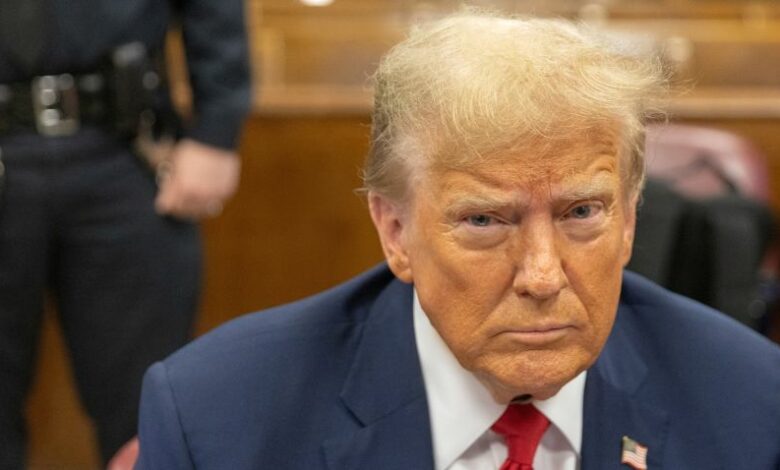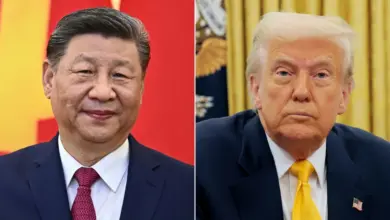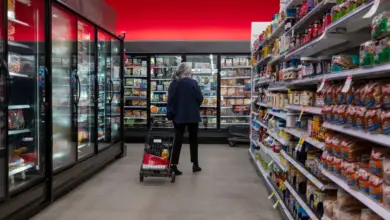
The mood flips from torpor to high tension in a second on the high-security 15th floor of the grimy old Manhattan courthouse where a jury will resume deliberations on Donald Trump’s fate Thursday morning.
Seven men and five women jurors, headed by a foreperson who grew up in Ireland, were deep into a fourth hour of their historic task when they shattered the oppressive tedium of Wednesday afternoon. A buzzer demanding the judge’s attention sounded, suddenly sending lawyers, court staff, police and reporters rushing for their seats. Then Trump arrived from his holding room, tugging heavily on his lapels. The presumptive GOP nominee sported a trademark extra-long tie — but in gold rather than his “Make America Great Again” campaign trail red.
In the end, the alarm did not herald a verdict in the hush money trial that could brand the 45th president a convicted felon. It was a note from the jury asking for a read back of several long and dense pieces of testimony, from former tabloid kingpin David Pecker and the star prosecution witness, Trump’s former fixer Michael Cohen. Their testimony gets right to the question of Trump’s intent in seeking to snuff out scandalous stories about his personal life, which may shed light on the payoff to adult film star Stormy Daniels facilitated by Cohen, according to prosecutors, under his boss’ orders. (Trump has denied the alleged affair with Daniels and pleaded not guilty in the case.)
As Judge Juan Merchan and lawyers combed transcripts filled with complex and sometimes seedy testimony, the buzzer buzzed again, with a new request from the locked down jury. Reporters in an overflow courtroom groaned when it emerged that jurors wanted to hear Merchan’s instructions — which he spent a painstaking hour reading aloud Wednesday morning — all over again.
No one outside the room where 12 citizens mull a defendant’s fate knows what’s really going on. That didn’t stop tealeaf reading on the row of television standup locations across the street. The jury’s desire to wade through testimony suggested that no verdict was imminent — and that they grasped the magnitude of their duty in a case that is critical to Trump’s reputation and the nation’s future.
Even for those armed with the publicly released courtroom transcript, Merchan’s instructions were potentially confusing to the layman. The jury doesn’t get a printout, according to New York law, so it’s not surprising they wanted clarity. CNN senior legal analyst Elie Honig said the instructions were “way too much for any human being to absorb and make sense of.”
The key question at the root of the trial
The jury’s requests highlight the big question in a prosecution that is using a novel interpretation of the law to try to hold Trump to account over the 2016 presidential election, which seems a lifetime ago.
As Merchan explained, the ex-president is facing 34 charges of falsifying business records. Such an act is only a misdemeanor in New York. To convict Trump of a felony, therefore, the jury must also find that he falsified the documents to hide another crime. Prosecutors are not required to prove a secondary crime took place or even to nail down exactly what it is. In this case, the Manhattan District Attorney’s Office raised the possibility of tax law infringements and the intent to falsify other documents and suggested Trump may have wanted to violate election law using “unlawful” means to deprive someone else of an election win.
If the jury — which sat through days of testimony — needs more help, the chances of voters with only a cursory knowledge of the case forming their own strong impressions seem remote.
Trump’s vigil
As Merchan laid out his instructions for the first time on Wednesday, Trump watched from the defense lawyers’ table. He rocked back in his chair and closed his eyes, and just when it appeared he might be snoozing, shook his head contemptuously and grimaced as Merchan read out the 34th charge. At one point, Trump reached inside his jacket and pulled out a pen to write a note to his square-jawed defense lawyer Todd Blanche to his right. When his pen seemed to fail, he reached out a hand and grabbed his attorney’s pen from atop his legal pad so he could scribble a message. He made sure to return Blanche’s pen before returning his own to his pocket.
Trump’s confinement at the court all day awaiting the whims of 12 citizens of New York City — where he made his name as a tabloid-bait real estate developer — hinted at the extraordinary power imbalance revealed by this trial and his multiple legal threats.
Ex-presidents cruise through life in a bubble of deference. Their magnetism lingers along with Secret Service details even after their formal powers are gone. They run on their own time and dominate every room. And Trump has long lived in rarified air, in his skyscraper penthouse, his beach club, on golf resorts boasting super-size fountains and waterfalls or on his personal Boeing. But after weeks in a courthouse built on the site of a former dungeon, Trump can only sit and watch the minutes tick by before he learns if he will enter November’s election as a felon.
Still, the longer the deliberations go on, the more hopes will rise in Trump’s camp. They might be clutching at straws, but the ex-president’s allies believe a long wait for the jury could deliver him a more favorable verdict, sources told CNN’s Kristen Holmes. “Look, it was possible the jury was going to come back, guilty verdict in 45 minutes — every minute after that gives some hope (for a hung jury),” one adviser said.
The ex-president’s only way of letting off steam is in a pen outside Merchan’s courtroom, where he stands behind crash barriers in front of a pool of cameras and blasts the judge, the case, and falsely claims the entire process is proof of a plot by President Joe Biden to stop him from reclaiming the presidency in November. Trump’s routine — aimed at voters as he seeks to delegitimize the case before the jury makes up its mind — is getting old. One new wrinkle Wednesday was his warning that the jury instructions could doom his defense. “Mother Theresa could not beat these charges. These charges are rigged.”
The jury hears none of this, so it’s clear Trump is playing an outside political game.
The presumptive GOP nominee’s immediate fate is in the hands of jurors who were cross-examined for signs of political bias before the trial began and include a West Harlem man who works in sales, a young female teacher and a speech therapist. Two of the jurors are attorneys and could potentially give deliberations some structure, according to Jeff Swartz, a former Florida judge. “If the two lawyers agree with each other, that is where the jury is going to go,” Swartz told CNN on Wednesday.
Merchan told jurors before sending them off to deliberate, “You are asked to make a very important decision about another member of the community.”
Despite his fame, wealth and power, that is exactly who Trump is — just a lonely defendant awaiting a jury’s verdict.




